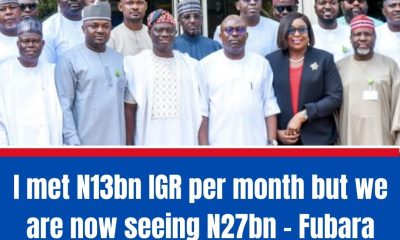News
Only three states generate more IGR than FAAC allocations — Dr. Ayawei

According to Dr. Nimibofa Ayawei, Executive Chairman of the Bayelsa State Internal Revenue Service, only Lagos, Ogun, and Kaduna states generate internal revenue, also known as Internally Generated Revenue, IGR, above the allocation received from the Federal Account Allocation Commission, FAAC.
Dr. Ayawei stated this at the 47th induction ceremony of the Chartered Institute of Taxation of Nigeria, CITN, noting that the other states rely solely on FAAC to meet their responsibilities to their citizens, emphasizing that the states must do more to increase IGR.
“We all know that the major sources of revenue to states have been from the Federal Account Allocation Committee, FAAC, and Internal Generated Revenue, IGR,” the guest lecturer said, among other things. In general, the government is responsible for infrastructure, security, health, and education. Each tier of government must meet these responsibilities based on the availability of resources, which necessitate revenue. In addition, the state’s primary source of revenue is dwindling.
“We get more money from FAAC, and FAAC’s foundation is oil.” FAAC is on the verge of becoming a spendthrift. As a result, looking inwards becomes necessary, which is IGR. Improving and sustaining IGR has been a major challenge for states. There is always a need to bridge the revenue-budgetary gap by increasing IGRs at the state level.
According to the figures from the Nigerian Governors’ Forum, only about three states can generate IGR greater than their FAAC allocations. Lagos received N554 billion versus N253 billion from FAAC, Ogun State received N100 billion versus N1.6 billion from FAAC, and Kaduna received N89 billion versus N79 billion from FAAC. FAAC is heavily used by all of the other states. While IGR has become the panacea for infrastructure development and public service funding, the challenges rest with state tax collections.
“Bridging the gap entails examining these areas.” The informal sector is the most important untapped market. It is quite large, but it is not taxed. Looking inwards will require tax practitioners to become more knowledgeable about the informal sector. There are also many wealthy people in Nigeria who do not pay their fair share of taxes. Consider someone who purchases a G-wagon and pays annual taxes of N35, 000 or even N200, 000. You have a feeling that something is wrong somewhere.
Earlier, in his welcome address, CITN President Mr. Adesina Adedayo stated, “It is a given that taxation in the twenty-first century 4th Industrial Revolution era has transformed significantly.” The global digital economy has expanded dramatically, fueling an increase in e-commerce and online transactions. Despite the benefits associated with the expansion of the digital economy, several challenges have arisen. Among these challenges, the tax implications of the digitalized economy are perhaps the most pressing, befuddling revenue authorities, government policymakers, international organizations, and tax professionals.
-

 Sports6 days ago
Sports6 days agoFA Cup: Man Utd suffer fresh triple injury blow ahead Coventry clash
-

 Business5 days ago
Business5 days agoI met N13bn IGR per month but we are now seeing N27bn – Fubara
-

 News6 days ago
News6 days agoDespite Apology, ABU Zaria Final-Year Law Student Arrested For Defaming Police Officer On Facebook
-

 Politics5 days ago
Politics5 days agoSERAP To Govs, Wike: Account For Trillions Of FAAC Allocations
-

 News4 days ago
News4 days agoCourt orders Becky Buodeigha alias Becky Minaj, CEO of BM Secrets to pay Baraza N7m
-

 Politics6 days ago
Politics6 days ago‘Ondo APC Guber Primary Result already written’ — Aspirant cries out, demands postponement
-

 Politics3 days ago
Politics3 days agoEFCC: I am Ready to Appear in Court But Afraid of Arrest – Yahaya Bello
-

 Business6 days ago
Business6 days agoInvest in Bayelsa, Governor Diri tells Elders, leaders of the state




















